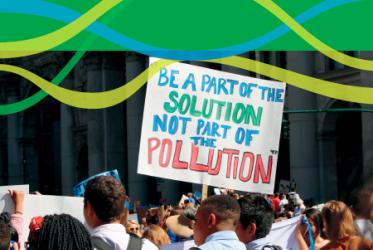Latin American and Caribbean Jubilee 2000 Platform
"Yes to Life, No to Debt"
The foreign debt of the so-called Third World, due to its exorbitant amount and rate of growth, and because of worsening conditions, now excludes four-fifths of the world's population from economic and social development. The debt is a direct reflection of the unjust international economic order, the result of the long history of slavery and exploitation to which our peoples have been subject.
In the mid 1970s, Latin America's foreign debt totalled $60 billion. By 1980, it was $204 billion, and by 1990, $443 billion. It is estimated that the amount will reach nearly $706 billion in 1999, requiring an annual debt service payment of $123 billion. In payments to service the foreign debt alone, the region paid out $739 billion between 1982 and 1996 -- more than the entire accumulated debt.
Under these circumstances, the foreign debt has been and continues to be unpayable, illegitimate, and immoral.
It is impossible to pay. There is no mathematical formula that can achieve it. Two full decades of unattainable financing plans drawn up for developing countries have demonstrated this with complete certainty.
The debt is illegitimate because, in large measure, it was contracted by dictatorships, governments not elected by the people, as well as by governments which were formally democratic, but corrupt. Most of the money was not used to benefit the people who are now being required to pay it back.
The debt is also illegitimate because it swelled as a result of interest rates and negotiating conditions imposed by creditor governments and banks, who persistently and outrageously denied debtor countries the right of association, while the creditor groups joined together in veritable creditor syndicates (Club of Paris, Management Committee), backed by the economic coercion of the International Monetary Fund and the World Bank. Their strategy was clear: you negotiate on your own; we negotiate as a bloc.
In addition, it is immoral to pay the debt because in order to do so, the governments of our countries would have to allocate an extremely high percentage of public spending, which mainly affects the delivery of social programmes and the wages of working men and women, generates unemployment and seriously hurts the economy. There is already a huge social deficit in terms of people's health, education and nutrition. Governments today spend 60% less per capita than they did in 1970. Furthermore, attempting to increase exports will only lead to super-exploitation of our natural resources, which will increasingly damage the environmental balance of our countries and threaten the very survival of future generations.
The debt is also used as a justification to maintain neo-liberal policies, including structural adjustment programmes, as institutional mechanisms to perpetuate dependence.
Bail-out programmes by creditors, with the support of the International Monetary Fund and the World Bank, including the Highly Indebted Poor Countries initiative, have only served to ensure the continuity of mechanisms to keep countries deep in debt.
From the legal perspective, we stress the fact that international and national laws on debt generally fail to meet the objective of ensuring peaceful coexistence. These are legal measures which threaten the paramount objective of the law, work against the public interest, and jeopardize social peace: therefore, they have no legitimate raison d'être. Usury and the charging of interest on top of interest should be forbidden. The monopolistic practices of banks, international institutions and first-world governments are illegal, as is the denial of the right of free association for debtor nations. Systematic and quasi-legal corruption, the flight of capital and "tax havens" are an integral part of the legal problems involved in foreign debt.
In the Bible, Jubilee (Lev. 25) calls for justice between creditors and debtors, as well as peace and harmony within human society, nature, and the universe, and the elimination of enslavement resulting from debt.
On the threshold of the new millennium, considering the unbearable situation in which our peoples live, and inspired by the biblical teaching of Jubilee, we are launching the Latin American and Caribbean Jubilee 2000 Campaign, joining the international movement calling for the cancellation of the debt of impoverished nations of the world by the year 2000 (Note: the Spanish text of the Tegucigalpa Declaration uses the word "anulación" or annulment, in order to underscore a proactive position, as opposed to expecting a unilateral concession from the North that presupposes the legitimacy of the cancelled debt).
Demands of the Latin American and Caribbean Jubilee 2000 Campaign:
- Cancel (annul), by the year 2000, the immoral and illegitimate debt of the countries of the third world in accordance with the following principles:
- Transparency in the process, and inclusion of all stakeholders.
For future negotiations: limit the service on the foreign debt to a percentage not to exceed 3% of a country's budget, in consideration of the precedent of Peru in 1946 and Germany in 1953.
Comprehensiveness and co-ordination with all the stakeholders involved, in consideration of the insolvency law in countries such as the United States which regulates insolvency proceedings for municipalities.
The right to appeal by any debtor nation. Creditors and debtors will appoint an equal number of judges to an arbitration panel or tribunal. Debtor nations will make such appointments on the basis of broad consultation with all sectors of society.
In certain cases, when the arbitration tribunal deems appropriate, a mechanism may be created to study possible partial cancellation of debt, taking into account the range of indebtedness, origin of the debt, and the level of poverty of the population.
- In the process of cancelling (annulling) the debt, consider the urgent need to ensure the right of Latin America, the Caribbean, Africa and Asia to develop, as well as compliance with all human rights of individuals and peoples, and an end to the current impunity.
- Conduct a broad audit of the process of indebtedness of each nation, using local tribunals, with the participation of civil society organizations in order to ensure transparency and access to information for all citizens.
- Ensure that resources freed up from the payment of foreign debt be used to repay the social and environmental debt to our peoples through plans and programmes for human development, particularly the creation of decent jobs; strengthening of social policies on education, health and social security, as well as environmental protection; consideration of the impact of all policies on the most vulnerable groups, especially boys and girls, older women and men, women in general, and indigenous persons; and unsure the active participation of civil society in the design, implementation, follow-up and evaluation of the entire process.
- Transform the current international economic and financial system to place it at the service of human beings, based on international relationships between nations and peoples predicated on justice, equity and solidarity. It is therefore necessary to strengthen the political agencies of the United Nations, restoring their function of policy development, a role which has been usurped by administrative agencies.
- Completely reject the Multilateral Agreement on Investment for the absolute subordination of men and women, peoples and nations it would entail to markets and capital.
We call on Jubilee 2000 campaigns in creditor nations to embrace the demands expressed in this proposal. We appeal especially to campaigns in the North not to put forward resolutions or make any laws which would include specific figures, nor any which would provide less than what we are currently proposing.
We call on the peoples of Latin America, the Caribbean and the world to develop new power relations at all levels of society, to ensure the ongoing struggle against all forms of injustice, violence and discrimination.
We are strongly on the side of peace with dignity and justice.
"No to debt, Yes to Life"
Tegucigalpa, 27 January 1999, Latin American and Caribbean Jubilee 2000 Coalition including members from Argentina, Bolivia, Brazil, Costa Rica, Cuba, Ecuador, El Salvador, Guatemala, Haiti, Honduras, Jamaica, Mexico, Nicaragua, Panama, Peru and Venezuela.



